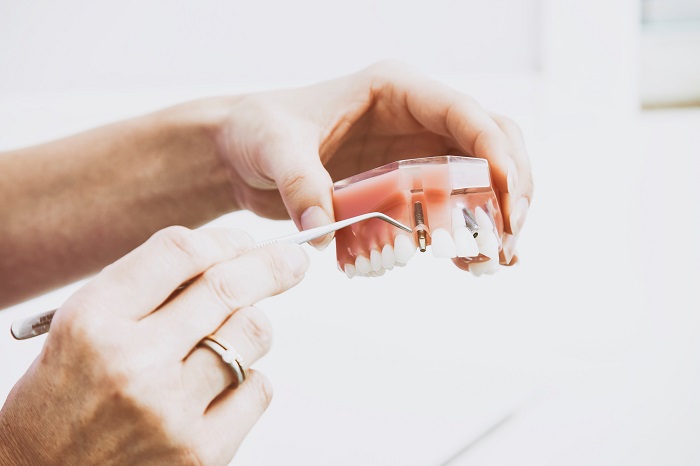There are many reasons a person might be considering dentures or dental implants. Some of the most common reasons include the loss of a tooth (or teeth) due to an accident, gum disease, tooth decay, or dental fractures. Many factors go into deciding which tooth replacement option will be best for you, including cost, convenience and more. So let's take a look at dentures and dental implants in detail.
Dentures
Many people choose to take the route of getting fitted for dentures for missing teeth. This is especially true because dentures generally cost less than dental implants and there are typically no surgeries required to obtain dentures. However, there are also many reasons a person would not choose dentures over dental implants.
The Denture Procedure
As previously stated, there are no surgical procedures required to obtain dentures, unless your dentist recommends extracting any remaining teeth to prepare your mouth for a denture(s). Once you have been prepared and an alginate impression has been taken, you then make the decisions on shape, size, and color you would like for your dentures. Once all is set in place, your dentist and a dental laboratory will work together to create your dentures. Once they are produced, you then try them out until your next appointment, where adjustments can be made accordingly.
Cost of Dentures
Dentures tend to be less expensive than dental implants, making them a popular choice among those who need to replace missing teeth. The average denture can cost between $600 and $1000. While it is possible to go with the cheapest option, you will find that you get what you pay for. Higher quality dentures use better materials and techniques to replicate the teeth and gums as naturally as possible. They will also last longer than the most basic pair of dentures.
Denture Care
Denture maintenance is more intensive than that of dental implants. It is important to brush your dentures every morning and night to avoid plaque buildup. Brushing will also protect them from discoloration. In addition to brushing your dentures, dentists cannot stress enough the importance of keeping up with your dental hygiene, even if you use a complete set of dentures. Brushing your gums, tongue, and the roof of your mouth with a soft-bristled toothbrush will help stimulate circulation in your tissues and helps remove plaque.
Benefits of Dentures
- Affordable: Between dentures and dental implants, dentures are the more inexpensive option.
- Non-invasive: Unless teeth need to be pulled to prepare the mouth for dentures, there is no invasive surgery needed to qualify for dentures.
- Support face structure: With the loss of teeth comes the deterioration of facial structure. Dentures can help prevent that by supporting the cheeks and lips and restoring height between the upper and lower jaws.
- Quicker Process: Dentures typically have a quicker turnaround time than other options due to there being no surgery and healing involved. You can usually have the end product much quicker than with dental implants.
Drawbacks of Dentures
- Restricted diet: When it comes to wearing dentures, it is recommended to avoid hard or sticky foods.
- Additional maintenance: As previously mentioned, dentures require more maintenance when it comes to cleaning them.
- May interfere with speech: Even though dentures are designed to look and feel as natural as possible, they just aren't your natural teeth. They may be bulkier and can cause speech interference while you are adjusting to them.
- Longevity: Dentures normally need to be replaced anywhere between 7 and 15 years, whereas dental implants typically last a lifetime.
Dental Implants
Dental implants are artificial teeth that are made to look and function like natural ones. They are great alternatives to dentures because they provide more stability and strength for chewing, biting, and more.

The Dental Implant Procedure
The dental implant procedure essentially replaces the roots of a tooth with metal, screw-like posts, and replaces the missing or damaged teeth with artificial ones. Depending on the person and the number of dental implants needed, there may be one procedure, or there may be multiple. Because the purpose of the dental implant requires the bone to heal around the implant, this process can take months to complete.
Cost of Dental Implants
Due to the simple fact that dental implants are universally more expensive, it is likely that the surgery will either not be covered at all by your insurance or have an alternate benefit be provided. Most insurances will state that they provide a benefit as if it was a lesser quality procedure, such as a bridge or denture. However, it may be worth spending the money once, rather than spending money on dentures every 7 to 15 years. As previously stated, it all depends on the person and the type of work that needs to be completed.
Dental Implant Care
Caring for dental implants is just the same as caring for natural teeth. Routine brushing and flossing, as you would do normally, help ensure good dental hygiene, while also keeping your new implants white and bright!
Benefits of Dental Implants
- Comfort: Since they are meant to replicate a tooth root, dental implants hold their place and do not move.
- Protect natural teeth: Implants are essentially screwed into place, therefore they will not shift. As a bonus, they also protect the surrounding teeth from moving as well.
- Maintenance: With dental implants, you can brush and floss just as you can with natural teeth. The peace-of-mind that comes along with the maintenance of dental implants is what makes them an appealing option for replacing missing teeth.
- Longevity: Since the jawbone is supposed to heal around implants, dental implants are designed to last a lifetime.
Drawbacks of Dental Implants
- May not be covered by insurance: Dental implants are largely regarded as "unnecessary" surgery and therefore may not be covered under insurance due to the fact that there are usually less expensive options. It is important to consult your dentist and your insurance company to see if dental implants are covered under your policy.
- Expensive: With the notion that dental implants are typically not covered by insurance, paying out of pocket for them can be quite a financial burden. Finding affordable dental implants can be tough, especially since just one can cost anywhere between $1,000 to $3,000. If you are in need of a full set, your bill can quickly rack upwards of $30,000.
- Invasive: In order to receive dental implants, it will require at least one invasive surgery to actually implant the artificial tooth in your jawbone. This can be a stressful experience for some people, which is why it is great to have more than one option to replace missing teeth.
Which one is right for you?
Finding affordable dental implants as well as finding dentures that fit and are comfortable can be difficult. That is why at Kneib Dentistry, we work with you and your insurance company to determine which option for replacing missing teeth would be best for you.


